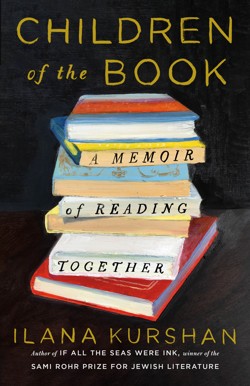The moment my oldest child was born, I reached for an anthology of Romantic poetry that I have owned for decades and began reading. “Sweet joy befall thee,” I said to my baby, through tears, bestowing a blessing with the words of William Blake.
The benediction was unplanned. I had brought the book to the hospital for myself, along with a memoir by Shirley Jackson and a pile of well-worn novels, because I’d imagined that I would want to be surrounded by my favorite writers at a time of such magnitude. But as soon as my squirming newborn was placed on my chest, I was overcome by the desire not to keep these works to myself, but to share my love of literature with my baby.
As a child, I had read more or less continuously to myself, with breaks only here and there: for dinner, for math class, for college graduation. I couldn’t imagine why anything should change now that I’d become a parent. Still, it felt rude to keep my eyes on a book when I had a baby in my arms, who, I had been told, was born with the capacity to see only as far as his mother’s face—my face. So I resolved that rather than reading quietly, I would do so aloud, drawing my son, Matan, into the text alongside me.

The practice let me connect with him (and, later, with my other four children) through the activity I enjoyed most. When I think about the pleasure of those exchanges, it saddens me to know that these days, fewer parents seem to be reading aloud to their kids. In a recent survey of U.K. parents, conducted by NielsenIQ BookData in collaboration with two children’s-book publishers, just 41 percent of parents with children ages 4 and younger said they frequently read aloud to their children, down from 64 percent in a similar survey they conducted in 2012. Looked at one way, that decline suggests a missed opportunity for parents to instill in their children an early love of reading. But I’d argue that parents who don’t read to their kids miss out on even more. Reading aloud to my children was, at least for me, a way to guide them as they started to understand the world, and as I started to understand them.
In the maternity ward, I read to my son constantly. We were interrupted repeatedly—by nurses coming to check vitals, or loud announcements over the hospital loudspeaker—which made it hard to get through a chapter, let alone an entire book. So I read poetry instead: Samuel Taylor Coleridge’s “To an Infant,” William Wordsworth’s “Ode: Intimations of Immortality From Recollections of Early Childhood.” At home, where it was calmer, we switched to novels, starting with Olga Tokarczuk’s Drive Your Plow Over the Bones of the Dead—until a friend prompted me to wonder whether I ought to read books with pictures that my son could see and pages that he could touch and chew. It was my first experience of maternal guilt: Why had I assumed that he was interested in the tale of a reclusive translator stumbling on dead bodies in the frozen Polish woods?
So I added board books to our repertoire. One that I remember vividly was very simple, with no words except the title, Black & White. It seemed fitting, given infants’ limited color vision. The book unfolded like an accordion: One side had a series of white objects depicted against a black background, and the other side had a series of black objects depicted against a white background. The first time I read it, I took a deep breath, as if warning Matan that what he was about to hear would sound very different from Blake, or Coleridge, or Tokarczuk. I pointed to each object and made up a tune that I sang as I “read” the book aloud—bottle and keys and button and boat; butterfly, leaf, banana, and bird. It was almost like poetry.
As I unfolded and refolded the black-and-white accordion pages, I wondered how much Matan was absorbing. He was soothed by the cadences of my voice, but I couldn’t tell if he was able to focus on the objects, or to distinguish black from white. At that point, like most newborns, he was still adjusting to the pattern of day and night. Each time I read Black & White, I imagined that I was teaching him to see—drawing back the darkness so that the light might appear distinct and his vision might sharpen into focus.
The separation of light and darkness is one of God’s first acts in Genesis, part of the creation story. But the midrash—the Jewish rabbinic interpretive tradition—tells a different version. According to the rabbis, the Torah existed for 2,000 years before creation. They teach that just as an architect cannot build a palace without a blueprint, God could not construct the universe without the Torah.
In that version of the story, books are our guides—something that resonated deeply with me. When I read to Matan, I was teaching him how to make sense of his surroundings: how to discern the white bottle and boat from the black background on the page, and, later on, how to separate good from evil, right from wrong.
And, yes, I was of course teaching him how to read. Another of his favorite board books was First 100 Words, which featured full-color photographs of a series of labeled objects from a baby’s everyday life: brush, tub, duck, on one page; spoon, cup, bib on another. I watched in wonder as he learned to point with his tiny finger as I read aloud the name of each item and, later, as he learned to say them. “Spoon!” he cried excitedly, and it was as if he were summoning the object into existence then and there, creating his world through words.
Cynthia Ozick, in an essay titled “The Ladle,” writes about spoons as a metaphor for all the ways we dip into knowledge and draw up wisdom. The ladle in a kitchen drawer leads her to the Big Dipper and Joseph’s pit and the wells dug by the patriarchs in the book of Genesis. And now, as Matan encountered that spoon on the page, he too was dipping into a well of knowledge, drawing up wisdom.
So, I would come to see, was I. While Matan was still an infant, the delight of reading to him lay not in the pages we turned but in the wheels that seemed to turn in his mind as we read together: the flicker of recognition in his eye, the smallest trace of a smile. Each expression was a window into his expanding self. I wasn’t just reading a board book. I was learning how to read my child.
This article has been adapted from Ilana Kurshan’s forthcoming memoir, Children of the Book.
When you buy a book using a link on this page, we receive a commission. Thank you for supporting The Atlantic.
The post How Reading to My Baby Helped Me Read My Baby appeared first on The Atlantic.




